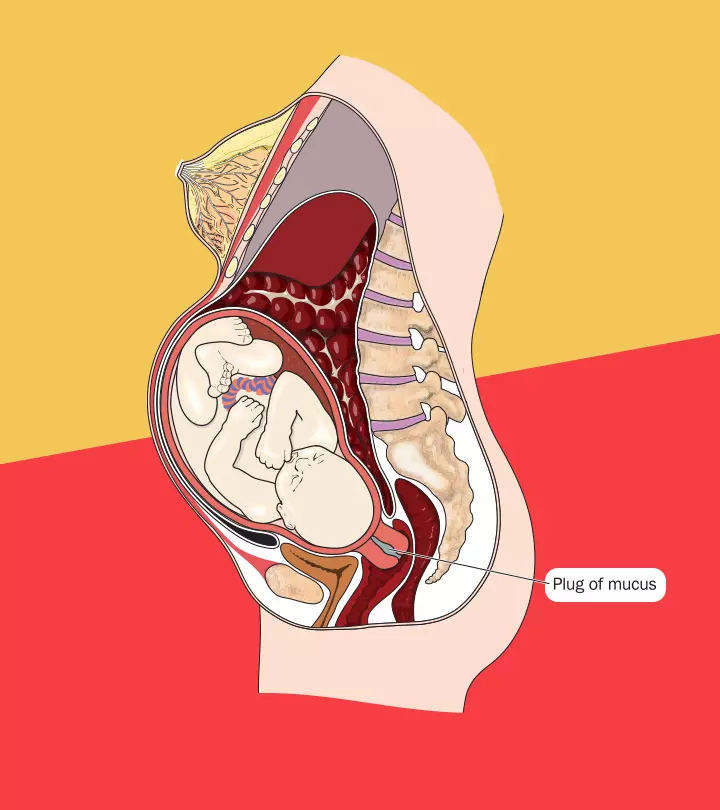
Image: Midjourney/ MomJunction Design Team
Castor oil is found in several cosmetic and medicinal products due to its beneficial properties. However, using castor oil for babies is a subject of apprehension for many parents. Generally, castor seeds contain a toxin named ricin, making unprocessed castor oil unfit for consumption. It has analgesic and anti-inflammatory properties too. But is it safe for children? Read this post to know about the necessary safety precautions to follow when using castor oil for oral use, its possible side effects, and different ways in which you can safely use castor oil for your baby.

Key Pointers
- Castor oil has various uses such as a laxative and to improve skin health.
- It is recommended to consult a doctor before consuming castor oil for babies.
- Application of castor oil on babies is preferred over consumption.
- It is used for babies to treat skin, hair, and constipation.
- Castor oil can cause abdominal cramping, diarrhea, and nausea.
Is Castor Oil Safe For Babies?
The US Food and Drug Administration has categorized castor oil as GRAS (Generally Recognized As Safe) and effective as a stimulantiA substance that temporarily improves an organism's or one of its parts' functional activity or efficiency. laxativeiMedicines that enhance bowel movements and are used in the treatment of constipation , though clinical trials are still underway to understand its mechanism (1).
The FAO/WHO Joint Committee on food additives established an acceptable castor oil intake of 0-0.7mg/kg body weight a day for adults, while the dosage for babies is not certain yet. So, consult the pediatrician before giving the baby castor oil for oral consumption. Even though the topical application of the oil is relatively safer, we recommend you talk to the doctor before going ahead with that.
The oral use of castor oil for a newborn baby could be dangerous and must be avoided (2).
For older babies, castor oil may be given only if recommended or approved by a pediatrician. The dosage of the oil will depend upon the purpose of the use. In the next section, we give you a list of ways in which castor oil has been traditionally used for babies.
Traditional Uses Of Castor Oil For Babies
1. Skin
A baby’s skin is very delicate and continues to develop at the cellular level until a certain age (3). So, it needs special care. Castor oil has ricinoleic acidiAn unsaturated omega-9 fatty acid mainly found in castor plant. , along with certain salts and esters, which function primarily as skin-conditioning agents, specifically as a moisturizer.
This property of castor oil, when applied topically, may help moisturize the baby’s skin naturally. The topical use of castor oil is not uncommon. It has been a part of traditional skincare practices followed for ages. It is also known to soothe irritated skin and is used for baby diaper rash.
 Quick fact
Quick fact2. Hair

Many traditional hair care practices involve topical use of castor oil for babies, as the oil contains anti-fungal and antimicrobial properties that can help prevent scalp-related bacterial or fungal infections in babies (4). It is also believed that castor oil stimulates circulation and thus promotes hair growth, as it contains vitamin E, nine essential fatty acids, and oleiciNaturally occurring fatty acid in animals, vegetable oils, and fats. acids besides minerals and enzymes.
However, the effectiveness of the oil in aiding hair growth in babies is not backed by clinical research. Therefore, it is not a guaranteed way to make your baby’s hair grow thicker or faster.
3. Constipation
Constipation is a common problem in babies and children. Before using castor oil or any other laxative, dietary changes should be made to relieve baby constipation. Intake of castor oil is believed to provide relief for constipation and thus is used as a common natural remedy for. According to FDA’s Over-the-Counter Drug Review Ingredient Status Report (2003), castor oil is classified as generally recognized as safe (GRAS) and effective for use as a stimulant laxative.
If your baby tends to be constipated, oral consumption of castor oil could be a home remedy, but only after a thorough consultation and approval of the pediatrician.
Note: Oral consumption of castor oil in infants poses the risk of lipoidiA fat-like substance pneumonia and must be avoided unless directed otherwise by your pediatrician (5). Lipoid pneumonia occurs due to aspiration of the oil due to ingestion.
4. Colic

Some people use castor oil for their babies to get symptomatic relief from coliciFrequent, prolonged, and intense crying or fussiness in a healthy infant. due to constipation (hyperperistalsisiExcessive contraction of the tubular organs of the gastrointestinal tract marked by rapid food transfer through the stomach and intestine. ).
The remedy involves warming a bottle of castor oil by placing it in a hot water bath. Once the oil is moderately warm to touch, it is used to massage the baby’s abdomen in a clockwise motion. This method of massaging with the oil has been traditionally used to provide relief for colic in babies; however, its effectiveness has not been clinically proven.
There are no clinical studies suggesting that topical application of castor oil can give babies relief from colic. So, consult your pediatrician even for topical use of the oil for babies.
In Haiti, castor oil is frequently used in teas for newborns. It’s believed to facilitate the passage of meconium stool and treat minor illnesses in infants (6).
The health benefits of castor oil are known mostly by experiential approaches, but not backed by scientific research. So, it is always essential that you consult the baby’s doctor before trying castor oil for your baby.
Side Effects Of Castor Oil
Like many other ingredients, castor oil may also cause some side effects:
- Mild allergic reactions on the skin, such as rashes or itching (or hives) (7)

- Severe allergic reactions like swelling of face, lips, or tongue
- Aspiration pneumonia
- Diarrhea
- Nausea, vomiting
- Stomach pain
Use the oil minimally after consulting the pediatrician, and if you notice any reactions, contact your doctor.
 Quick tip
Quick tipPrecautions While Taking Castor Oil
Even if the pediatrician recommends the use of castor oil, you may follow a few precautions before using it for babies:
- Castor oil can be an allergen. So, a patch test is recommended before use (8).
- Pick a variant of castor oil after careful evaluation of the baby’s needs. The varieties available are based on the refining process and include raw, cold-pressed, chemical extracted, Jamaican black and hydrogenatediChemical process of adding hydrogen. . Check with a pediatrician for recommendations.

- Castor oil can interfere with the digestive system and affects the absorption of nutrients and vitamins; thus, its oral use is not advised within two hours of meals (9). In any case, avoid oral consumption of the oil unless the pediatrician approves it.
- Taking castor oil on an empty stomach hastens its effect when used as a laxative. It takes around two to six hours to show results, so do not give it to your baby at bedtime as it could disturb your baby’s routine. Generally, its results slow down if it is consumed with the food. So, consult your pediatrician about the suitable time of ingestion for your baby.
- Chilling castor oil in the refrigerator for at least an hour may reduce its unpleasant taste (10). It is advised to mix the recommended dose of castor oil into a full glass of cold orange juice just before it is taken as that increases its palatability. You can also consider flavored preparations of castor oil that are available in the market.
- Before you plan to mix castor oil in any other medium, consult a pediatrician to avoid possible food reaction/ allergies or intolerance.
 Caution
Caution
Frequently Asked Questions
1. Are there any alternatives to castor oil for babies?
The alternatives to castor oil vary depending on what they may be needed for. When it comes to massaging the oil into the baby’s skin as a moisturizer and for other specific benefits, you can use edible vegetables or food-based oils such as sweet almond oil, sunflower oil, and coconut oil for babies. It is advisable to consult a pediatrician before using any oil to massage your baby (12).
2. How long does it take for castor oil to relieve constipation?
Castor oil should not be used to relieve constipation for a child younger than six years. For older children and adults, if castor oil is used sparingly to relieve constipation, it may take two to three hours. It may take up to six hours in severe cases, depending on the individual’s metabolism. Make sure you consult your doctor before taking castor oil as a medication, as it has the potential to have several adverse side effects (7).
Processed castor oil is free from toxins. Its oral ingestion is unsafe for newborns, but older babies can ingest or topically apply castor oil under a pediatrician’s guidance. Castor oil for babies is used for hair and skin care purposes in traditional medicine. However, it is used for constipation relief and colic relief also in some cultures. If your doctor allows you to use castor oil, do so after following the necessary precautions. Though several types of castor oil are available in the market, its flavored variants can make its ingestion easier.
Points To Remember When Using Castor Oil For Babies
The safety of using castor oil for babies is still debatable under certain circumstances. However, if you think the benefits outweigh the risks and want to use the oil for your little one, keep certain precautions in mind. Read the infographic below to know what they are and share them with others. Illustration: Momjunction Design Team
Illustration: Castor Oil For Babies: Benefits And Side Effects

Image: Dall·E/MomJunction Design Team
References
1. Final report on the safety assessment of Ricinus Communis (Castor) Seed Oil; National Centre for Biotechnology Information (2007)
2. Castor; Drug and Lactation Database; National Centre for Biotechnology Information (2019)
3. Teresa Oranges et al.; Skin Physiology of the Neonate and Infant: Clinical Implications; National Centre for Biotechnology Information (2015)
4. A Jadhav et al.; Herbal Hair Cosmetics – An Overview; World Journal of Pharmaceutical Sciences
5. Ujjal Poddar; Approach to Constipation in Children; Indian Pediatrics (2016)
6. Castor Oil; National Library of Medicine
7. Castor Oil Oral Solution; Cleveland Clinic (2017)
8. Michel Verheyden et al.; Contact Allergy to Castor Oil, but Not to Castor Wax; MDPI
9. Assessment report on Ricinus communis L., oleum; European Medicine’s Agency
10. Maurizio Clementi et al.; Gastro-intestinal Medications , Hyperlipidemic Agents and Spasmolytics (2015)
11. Zinc and Castor Oil (David Craig); Health direct, Government of Australia
12. Infant Massage: Coconut oil and Lotion;Children’s Hospital of Philadelphia (2025)
Community Experiences
Join the conversation and become a part of our nurturing community! Share your stories, experiences, and insights to connect with fellow parents.
Read full bio of Dr. Mubina Agboatwalla
Read full bio of Swati Patwal
Read full bio of Rohit Garoo
Read full bio of Anindita Ghatak
















